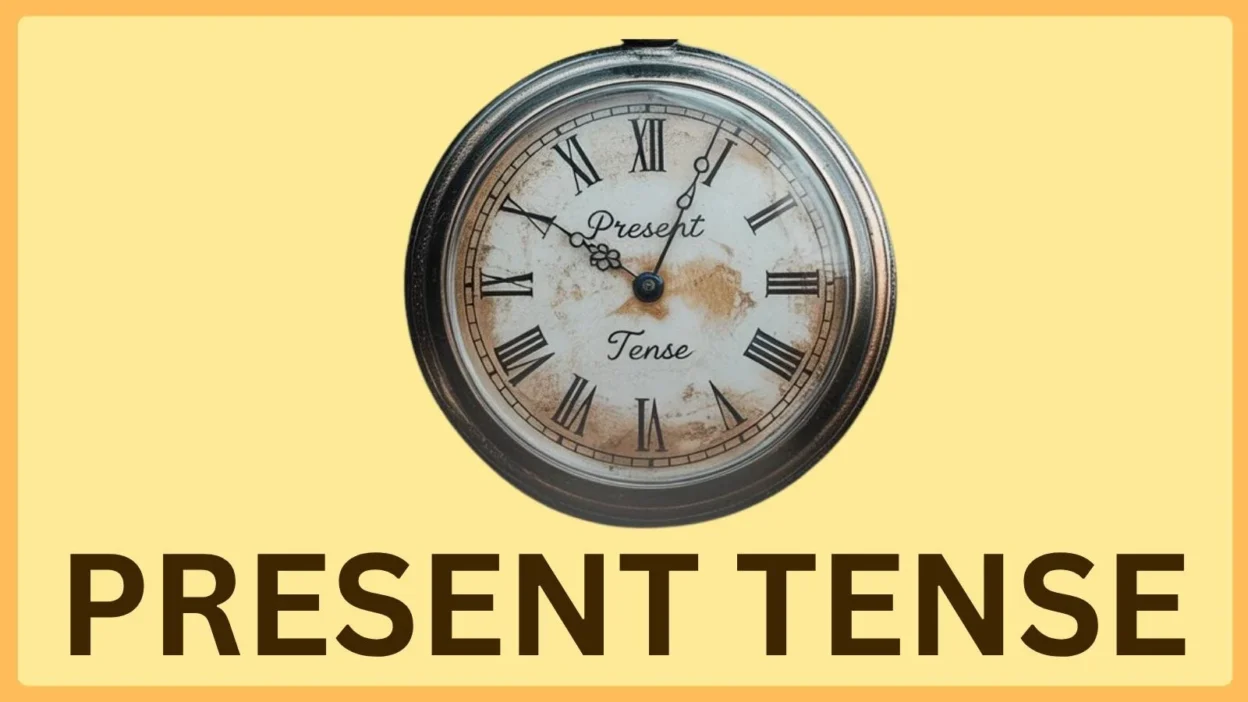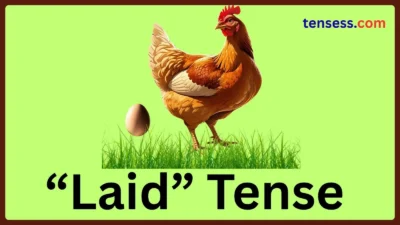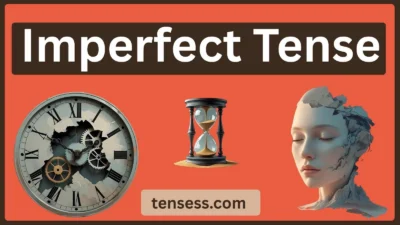The present tense is one of the most fundamental aspects of English grammar, used to describe actions, habits, facts, and states happening right now or regularly.
If you’re a student, language learner, writer, or grammar enthusiast, understanding how to use the present tense correctly is essential for clear communication.
This article breaks down the present tense, its structure, conjugation, and common mistakes, with practical examples to make learning easy.
From forming simple sentences to mastering verb conjugation, we’ll guide you through every step with a beginner-friendly approach.
By the end, you’ll feel confident using the present tense in your writing and speech.
Let’s dive into the world of present tense verbs and explore how they bring your sentences to life!
What Is the Present Tense?
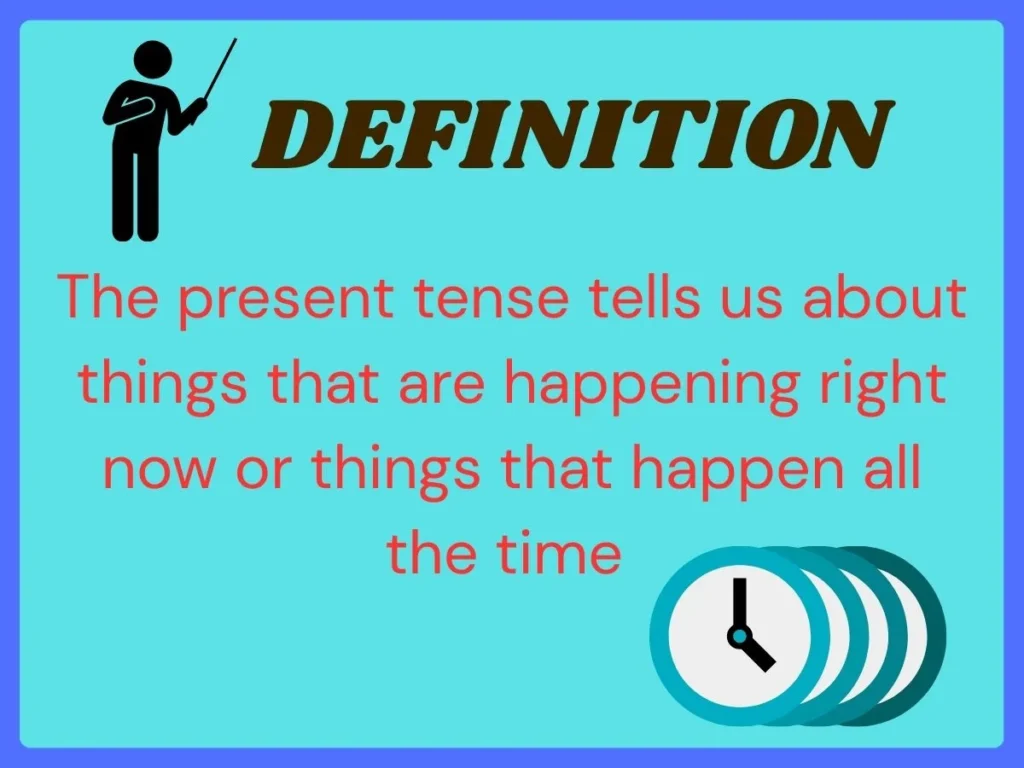
The present tense describes actions or states that are happening now, occur regularly, or are generally true.
It’s used for habits (e.g., “I walk daily”), facts (e.g., “The sun rises in the east”), and current states (e.g., “She feels happy”).
The present tense has four forms: simple present, present continuous, present perfect, and present perfect continuous.
This article focuses on the simple present tense, which is the foundation for expressing routines, facts, and feelings.
How to Recognize the Present Tense?
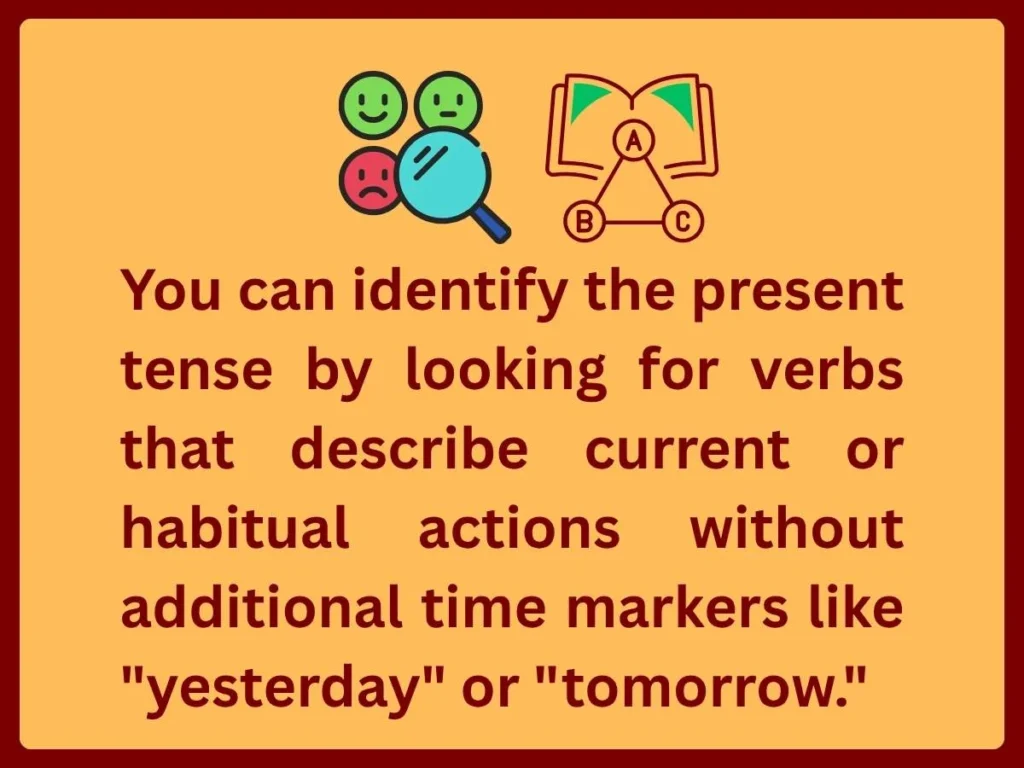
For example:
- Simple present: “He plays soccer every weekend.”
- Present continuous: “She is reading a book now.”
The simple present tense often pairs with time expressions like “always,” “usually,” or “every day.”
Structure of a Sentence
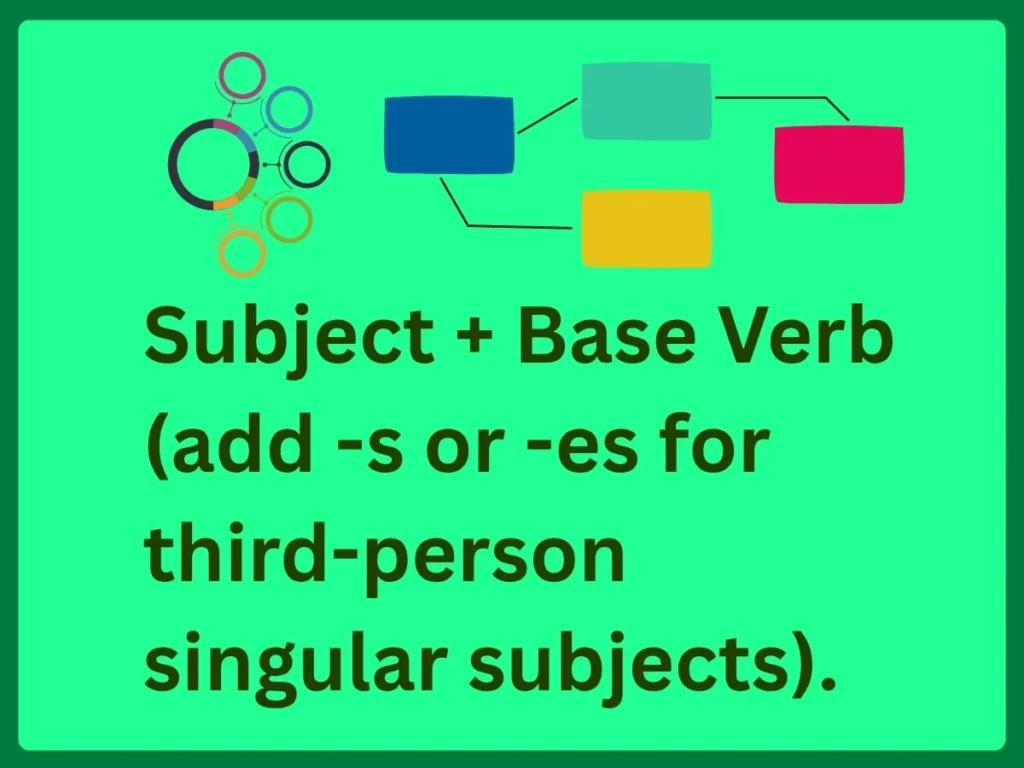
The basic structure of a simple present tense sentence is:
- Example: “I eat apples.” / “She eats apples.”
For negative sentences: - Subject + do/does + not + Base Verb.
- Example: “They do not like coffee.”
For interrogative sentences: - Do/Does + Subject + Base Verb?
- Example: “Does he play tennis?”
Formation
To form the simple present tense:
- Use the base verb for I, you, we, they (e.g., “I run”).
- Add -s or -es for he, she, it (e.g., “She runs”).
- Use do or does for negatives and questions.
- Negative: “She does not sing.”
- Question: “Do you dance?”
Verbs
The present tense uses regular verbs (e.g., walk, play) and irregular verbs (e.g., have, go). Regular verbs follow predictable patterns, while irregular verbs may change forms (e.g., “go” becomes “goes”).
Helping Verbs
In the simple present tense, the helping verbs do and does are used for:
- Question: “Do you like tea?” / “Does she know?”
- Negative: “I do not understand.” / “He does not care.”
No helping verbs are needed in affirmative sentences.
Explanation of Some Verbs with Reference to Present Tense
- Go: Becomes “goes” for he/she/it (e.g., “He goes to school”).
- Have: Becomes “has” for he/she/it (e.g., “She has a cat”).
- Eat: Becomes “eats” for he/she/it (e.g., “It eats grass”).
These verbs reflect the present tense by indicating current or habitual actions.
Table of Some Regular and Irregular Verbs in Present Tense
| Base Verb | I/You/We/They | He/She/It |
| Walk | Walk | Walks |
| Run | Run | Runs |
| Go | Go | Goes |
| Have | Have | Has |
| Eat | Eat | Eats |
| Write | Write | Writes |
| Sing | Sing | Sings |
| Drink | Drink | Drinks |
| See | See | Sees |
| Take | Take | Takes |
Simple Sentence Examples
- I read books every night.
- You play soccer with friends.
- We visit the park weekly.
- They study English daily.
- She writes stories.
- He runs every morning.
- It sleeps on the couch.
- John paints the house.
- The team practices regularly.
- Mary cooks delicious meals.
Negative Sentence Examples
- I do not read newspapers.
- You do not play chess.
- We do not visit museums often.
- They do not study math.
- She does not write poems.
- He does not run fast.
- It does not sleep outside.
- John does not paint walls.
- The team does not practice today.
- Mary does not cook spicy food.
Interrogative Sentence Examples
- Do I look tired?
- Do you like coffee?
- Do we need help?
- Do they play tennis?
- Does she sing well?
- Does he work here?
- Does it eat fish?
- Does John paint houses?
- Do the students study hard?
- Does Mary cook daily?
Negative and Interrogative Sentence Examples
- Don’t I seem happy?
- Don’t you enjoy movies?
- Don’t we have time?
- Don’t they like music?
- Doesn’t she dance gracefully?
- Doesn’t he read books?
- Doesn’t it play outside?
- Doesn’t John write well?
- Don’t the kids learn fast?
- Doesn’t Mary sing often?
How to Conjugate Present Tense
- Identify the subject (I, you, he, etc.).
- Use the base verb for I, you, we, they.
- Add -s or -es for he, she, it.
- For negatives, use do not or does not + base verb.
- For questions, start with Do or Does + subject + base verb.
- Check for irregular verbs like “have” (has) or “go” (goes).
- Use time expressions like “always” or “never” for clarity.
- Ensure subject-verb agreement (e.g., “She runs,” not “She run”).
- Avoid adding -s to plural subjects.
- Practice with different verbs to master conjugation.
Conjugation Table for All Subjects
| Subject | Verb: Walk | Verb: Have | Verb: Go |
| I | Walk | Have | Go |
| You | Walk | Have | Go |
| He/She/It | Walks | Has | Goes |
| We | Walk | Have | Go |
| They | Walk | Have | Go |
Spelling Changes or Irregularities
- Add -es to verbs ending in -s, -sh, -ch, -x, or -z (e.g., watch → watches).
- For verbs ending in a consonant + -y, change -y to -ies (e.g., study → studies).
- Irregular verbs like have (has), go (goes), and do (does) don’t follow standard rules.
- Verbs ending in a vowel + -y just add -s (e.g., play → plays).
Sentence Examples with Different Subjects
- I love chocolate ice cream.
- You watch movies every weekend.
- He drives to work daily.
- She sings beautifully.
- It barks at strangers.
- We travel every summer.
- They play basketball after school.
- John studies history.
- The cat sleeps all day.
- The children draw pictures.
- I write emails every morning.
- You read novels regularly.
- She cooks dinner for her family.
- He runs in the park.
- They dance at parties.
Common Mistakes with Present Tense
- Forgetting -s for he/she/it (e.g., “She walk” instead of “She walks”).
- Using do instead of does for third-person singular (e.g., “Do she sing?” instead of “Does she sing?”).
- Adding -s to plural subjects (e.g., “They walks” instead of “They walk”).
- Mixing tenses (e.g., “I go yesterday” instead of “I went yesterday”).
- Omitting helping verbs in negatives (e.g., “She not like” instead of “She doesn’t like”).
- Incorrect irregular verb forms (e.g., “He have” instead of “He has”).
- Using continuous forms incorrectly (e.g., “I am knowing” instead of “I know”).
- Misplacing time expressions (e.g., “I always am late” instead of “I am always late”).
- Overusing -es (e.g., “He playes” instead of “He plays”).
- Ignoring subject-verb agreement (e.g., “The team play” instead of “The team plays”).
Explain Frequent Errors and How to Avoid Them
- Error: Forgetting -s (e.g., “He walk”). Fix: Always check if the subject is he/she/it.
- Error: Wrong helping verb (e.g., “Do she go?”). Fix: Use does for he/she/it.
- Error: Adding -s to plural subjects. Fix: Use base verb for I/you/we/they.
- Error: Mixing tenses. Fix: Ensure time expressions match the tense.
- Error: Omitting do/does in negatives. Fix: Always include do not or does not.
- Error: Incorrect irregular verbs. Fix: Memorize forms like “has,” “goes,” “does.”
- Error: Using continuous for stative verbs. Fix: Use simple present for verbs like “know.”
- Error: Misplacing adverbs. Fix: Place adverbs like “always” before the main verb.
- Error: Overusing -es. Fix: Only use -es for verbs ending in -s, -sh, etc.
- Error: Subject-verb disagreement. Fix: Match singular/plural subjects with correct verb forms.
Related Verbs and Synonyms for Present Tense
- Go: Synonyms include travel, move, proceed. Example: “She goes to school” vs. “She travels to school.”
- Have: Synonyms include possess, own. Example: “He has a car” vs. “He owns a car.”
- Eat: Synonyms include consume, dine. Example: “They eat lunch” vs. “They dine at noon.”
- Write: Synonyms include compose, pen. Example: “I write a letter” vs. “I compose a letter.”
- Run: Synonyms include jog, sprint. Example: “He runs daily” vs. “He jogs daily.”
- Play: Synonyms include perform, engage in. Example: “We play soccer” vs. “We engage in soccer.”
- Sing: Synonyms include chant, croon. Example: “She sings well” vs. “She croons well.”
- See: Synonyms include view, observe. Example: “I see the movie” vs. “I view the movie.”
- Take: Synonyms include grab, seize. Example: “He takes the book” vs. “He grabs the book.”
- Work: Synonyms include labor, toil. Example: “They work hard” vs. “They labor hard.”
Tips to Practice Using Present Tense
- Write 10 sentences daily using different subjects and verbs.
- Read books and highlight present tense verbs.
- Practice speaking with a partner using only simple present.
- Use grammar apps to test your skills.
- Create flashcards for irregular verbs.
- Watch English shows and note present tense usage.
- Keep a journal in the present tense.
- Play grammar games online.
- Practice forming questions and negatives.
- Review your writing for subject-verb agreement.
Frequently Asked Questions
- What is the present tense? It describes current or habitual actions.
- When do I add -s or -es? For he/she/it with regular verbs.
- What are irregular verbs in present tense? Examples include “have/has,” “go/goes.”
- How do I form negative sentences? Use do not or does not + base verb.
- How do I make questions? Start with Do or Does + subject + base verb.
- Can I use present tense for facts? Yes, e.g., “The earth rotates.”
- What are common mistakes? Forgetting -s or using wrong helping verbs.
- How do I conjugate irregular verbs? Memorize forms like “has” or “goes.”
- What are time expressions for present tense? Always, usually, never, etc.
- How can I practice? Write sentences, read, and use grammar apps.
Exercises
- Write 5 simple present sentences with “play.”
- Convert 5 sentences to negative form.
- Create 5 interrogative sentences with “read.”
- Combine negative and interrogative forms for “sing.”
- Use “have” in sentences with all subjects.
- Identify present tense verbs in a paragraph.
- Correct 5 incorrect sentences.
- Write a short story in simple present.
- Practice conjugating “go” for all subjects.
- Make a list of 10 regular verbs and their forms.
Quizzes
- Is “They goes” correct? (Answer: No, “They go”)
- What helping verb is used for “he”? (Answer: Does)
- What is the correct form: “She ___ (walk) to school”? (Answer: walks)
- Convert: “I read books” to negative. (Answer: I do not read books)
- Make a question: “You play soccer.” (Answer: Do you play soccer?)
- What is wrong: “He run fast”? (Answer: Should be “He runs fast”)
- True or false: “Always” is a present tense time expression. (Answer: True)
- Conjugate “have” for “she.” (Answer: Has)
- Is “I am knowing” correct? (Answer: No, “I know”)
- What is the base verb of “studies”? (Answer: Study)
True or False
- The present tense is used for future actions. (False)
- “She walks” is simple present. (True)
- “They does” is correct. (False)
- Irregular verbs follow the same rules. (False)
- “Do” is used for he/she/it in questions. (False)
- Time expressions like “every day” indicate present tense. (True)
- “I have” becomes “I has” for third-person singular. (False)
- Negative sentences need do or does. (True)
- “Study” becomes “studies” for “he.” (True)
- The present tense can describe habits. (True)
Conclusion
Mastering the present tense is a key step for students, language learners, and writers aiming to communicate clearly.
By understanding its structure, conjugation rules, and common pitfalls, you can confidently use present tense verbs in everyday writing and speech.
From forming simple sentences to avoiding errors like forgetting the -s for third-person singular subjects, this guide provides the tools you need to succeed.
Practice with the exercises and quizzes provided, and try writing your own sentences to reinforce your skills.
For extra help, consider using a grammar checker or joining a language learning community.
Start using the present tense today, and watch your English fluency grow!
Share your favorite present tense examples in the comments or try our quizzes to test your knowledge.
